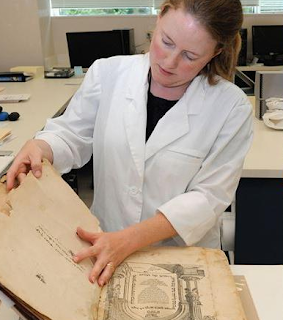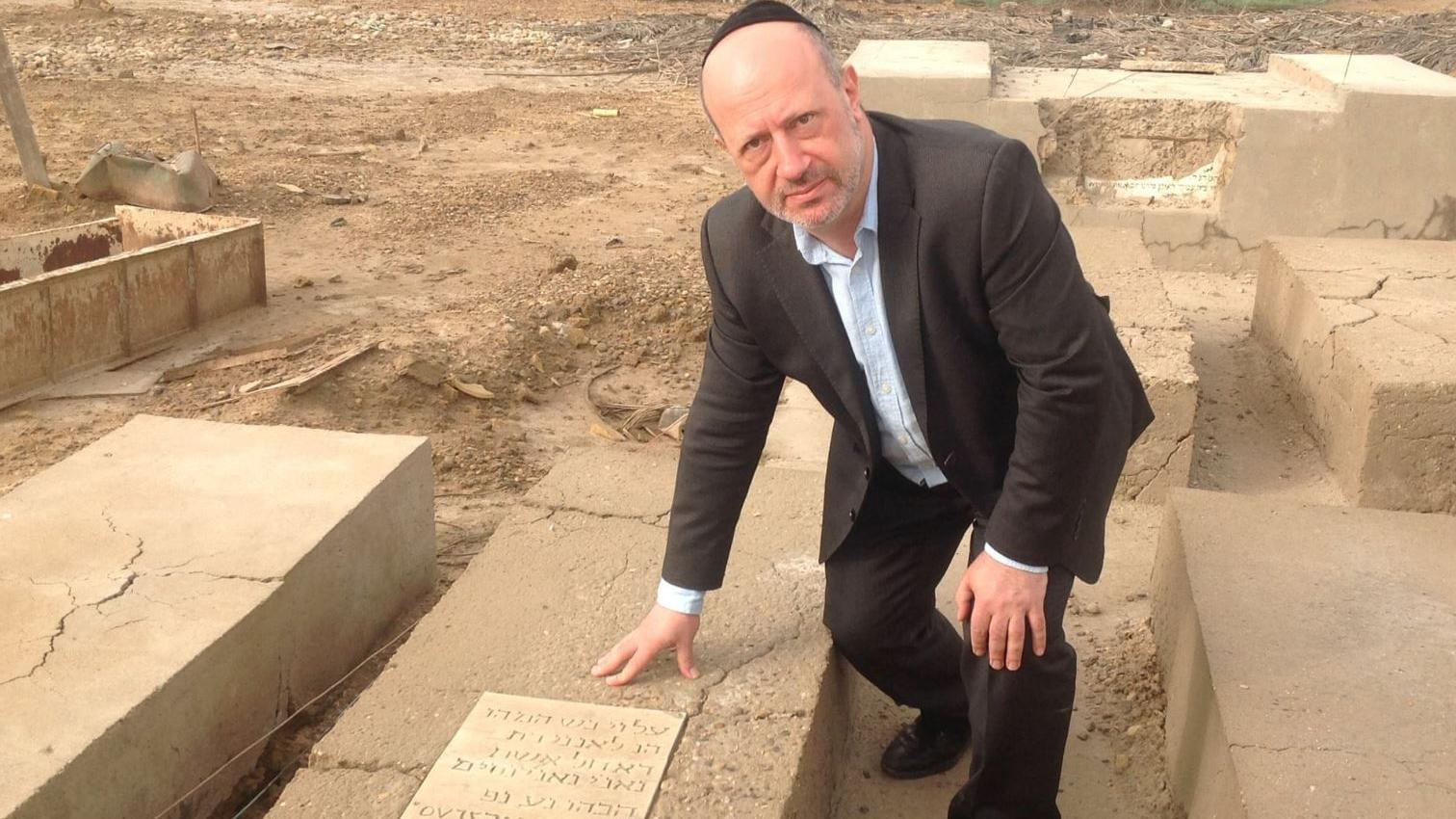
Edwin Shuker is the lead in a potential lawsuit that could be brought against Iraq, should it insist that the Iraqi-Jewish archive, which contains Shuker’s own school certificate, must be returned. Since the deadline expired in September 2018, however, the Iraqis have not formally asked for the archive to go back, although Shuker says that an unofficial extension has been agreed. He goes on to warn of the danger that Arab countries might lay claim to Jewish items even outside their countries if the US keeps signing bilateral agreements. Long feature in the Jewish Chronicle:
Fast forward to 2013; Mr Shuker was in Washington, speaking to a group, when he found out that the National Archive was due to exhibit items from the Iraqi Jewish community. He went to the archive and persuaded the curator of the exhibition and the president of the museum to give him a preview.
“We started working through the exhibit. ‘This is the oldest Torah — 16th century. This is the oldest Talmud.’
They were exhibiting 24 items — out of 27,000.
“And then they said ‘these are personal items’ — divorce documents, marriage documents, very personal — and they said ‘We also have an example of the Iraqi Jewish school called Frank Iny School, and these are the school reports of children.’
“I said, ‘that’s where I went’.
“There were two school reports, one for a boy and one for a girl. And the boy was me. I swear to God. The boy was me.
“I thought, ‘This cannot be’. I was looking for a candid camera around. I asked, ‘Excuse me, why did you choose this boy and this girl out of all the thousands?’
“She said, ‘We are experts in preserving letters, but not pictures. These reports had pictures — almost all of them were underwater and we cannot recover them, except this little boy, whose picture was just perfect.’
“I said, ‘Well, that little boy is me’. And she looked up, and you can imagine the emotion. We hugged each other.”
This, however, was far from the end of the story — and this was where Mr Shuker asked his Limmud audience to consider some issues with potentially very far-reaching consequences for Jewish communities.
“Recently the West has become very conscious and sensitive about things they have taken from the East — antiquities and all sorts of things,” he said.
He described how, “on a recent visit to the Foreign Office here, as part of the Board of Deputies relationship with the British government, they told us, in a great announcement, that they had managed to convince the British Museum to send back to Iraq some surplus material… as a gesture saying, ‘This belongs to you, please have it back’.
“And the great news that they wanted to share with us is that most of these are Jewish heirlooms.
“Similarly, the State Department is now making bilateral agreements with all these countries, saying, ‘We will not allow any of your items, especially the failed states of Libya, Syria and Iraq — we will not allow stolen and looted things from your museums to be traded here. We will seize it as stolen property and return it.’
“Wonderful. But then it actually states in the agreement, ‘including all the Jewish items and Jewish archives that are there’ — which is a huge market, by the way, Sifrei Torah.
“That agreement would mean that anything that Jews from Arab countries have left behind now has to go back.
“There are synagogues in the United States thinking, ‘We are going to have to justify why we have a Sefer Torah from Baghdad, which has to be returned’. It could be interpreted like that, if somebody wanted to.”
The idea that Jewish items, which were seized by Middle Eastern countries from Jews, are now to be returned to the governments of those countries by the UK and US is a painful one to many Jews, especially those from Arab lands.
The Iraqi archive is a case in point,with ramifications and implications far beyond this collection.
“When the Americans took the items, they were very sensitive that the Iraqis should not think that they [the Americans] were taking their culture away from them,” Mr Shuker said.
“So the State Department signed an agreement in black and white that the United States are borrowing this archive for the purpose of preservation, and it will be returned to Iraq as soon as that is done.
“As soon as this 2013 exhibit came along, the Iraqi embassy and the Iraqi government said, ‘Thank you very much, you’ve done a fantastic job, now we want it back.’
“They made a temporary agreement which ended in September 2018, which said ‘in September 2018, the entire collection goes back’.”
However, Mr Shuker has, as he has described, been “the lead in a Class A lawsuit” on this issue. After all, one of the documents in question is demonstrably his.
He believes that the school report would have been placed with the other archival material because of what would have happened when his family fled the country.
“There is a racist, antisemitic law in Iraq, which is still there today, started in 1951, law number five, which states that any Jew who leaves Iraq for more than three months automatically is considered to have renounced his Iraqi nationality and has no right to get it back. Even today.
“When we escaped from Baghdad in 1971, there was an announcement in the newspaper: ‘These are the runaways, you have three months to report back, otherwise your nationality will be taken away and your assets’, meaning they would go back to our home and strip it.”

Much of the rest of the archival material was taken directly from the Iraqi Jewish community by Saddam Hussein’s officials, Mr Shuker said.
“We went to people — still, 50 years on, people who worked in the Iraqi Jewish community at the time — they would not give their names in court. Most of these files were at the offices of the Iraqi Jewish community.
“In the early 80s, people came to them and said, ‘Saddam Hussein would like to have a museum for his Iraqi Jewish community. We want all your papers, all your archives.’
“The leaders said, ‘Of course, we would love to — please take everything.’ What else would you say to Saddam Hussein?”
There are understandable fears that the archive will be mistreated if it is returned to the country, with concern centred on how Jewish shrines in the country have been treated — in particular, the shrine of the prophet Ezekiel — since 2003.
“Nouri al-Maliki [Prime Minister of Iraq from 2006-2014] gave a tender to an Iranian company,” Mr Shuker explained. “They took over a huge area and constructed a very large mosque, which completely incorporated the shrine of Ezekiel. The graves were desecrated, the bones thrown out.”
Despite the agreement being that the archived items would be returned in September 2018, Mr Shuker told the audience, “We have been managing to delay the sending back by telling the US State Department, ‘We will hold you responsible if these archives go back to the same sewage waste that they came out of. What guarantee have we got that they are actually going to be treasured?’”
He confirmed that there had been a “three-year extension, which is not yet formal, you will not see it on the internet… to allow the Iraqis to come up with a proposal as to where are they going to keep it, how are they going to make it accessible — especially to the owners of those things, so that Edwin Shuker can take his son and say, ‘This is my certificate, this is the place they took from me’ — is that going to be open for us?”
However, Mr Shuker suggested that there were grounds for hope.
He described how “the new Culture Minister of Iraq, appointed last Tuesday, is a wise, kind man who loves our culture — many of us can call him a friend.”
He also cited an upcoming deal in Egypt which might provide a road map for other Arab countries in dealing with this issue. “In the next few weeks, the Egyptian government will announce that it is going to take over responsibility for the upkeep of certain synagogues,” adding there will also be a new board which will include members of Egypt’s tiny remaining Jewish community as well as experienced former members of Egypt’s Jewish community who now live in the diaspora.
Whether other countries will follow suit remains to be seen, but in Iraq, certainly, such an initiative seems needed.
“There are fifty-four synagogue properties in Baghdad alone,” Mr Shuker said.
“And in the basement of the Iraqi Museum in Baghdad, there are 400 Sifrei Torah”.

Leave a Reply